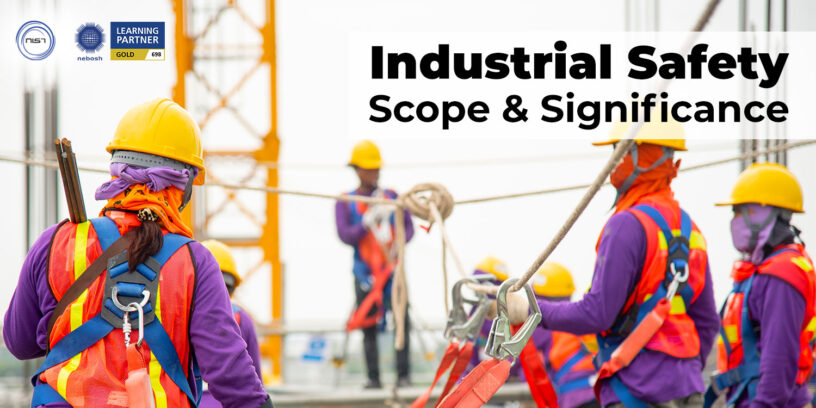Safety stands as the foremost priority in most of today’s technology-aided industrial processes that deal with large amounts of energy. A well-engineered safety system is critical for the protection of workers, equipment, the environment & society. And this is what Industrial Safety is all about! It is a countermeasure used to protect humans and assets against any risks, hazards, near misses and accidents.
What is Industrial Safety?
The term “Industrial safety” is a set of safety protocols, policies and regulations to protect the workers, workplace, work equipment and environment from hazards. It acts as a corrective measure that is reviewed and approved by safety experts periodically to ensure a safe workplace and sustainable business operations.
Why Industrial Safety is necessary?
With the alarming rate of industrial accidents happening every year, industrial safety is a crucial step save human lives. Moreover, workers must be educated on how to handle the equipment and basic safety procedures for adequate safety.
Let’s look at some main reasons why industrial safety is important,
Moral responsibility
It is the duty of care of an employer to affirm the basic morale of a workplace as it costs lives, longer recovery time, lost productivity and heavy personal inconvenience when injured. It is also the responsibility of an employer to be ethical and create a safe working environment.
Legal responsibility
ILO standards on Occupational Health & Safety proffers essential tools for employers, workers, and government in order to provide maximum safety at work. International Labour Organization (ILO) defines the global standards of protecting human rights that include working duration, employee welfare, safe practices, wages & compensation, labour requirements and other safety aspects which is practised internationally.
The Factories Act 1948 (amended on 1987) formulated national policies in India specifically for occupational safety health in factories & docks in India. It deals with the health, safety, efficiency & well-being of workers at the workplace.
Financial Responsibility
It is a legal requirement for employers to have insurance and also to plan for uninsured costs with their consequences. This will reduce the financial liability towards loss of property, equipment and productivity.
Objectives of Industrial Safety
In any incident, industrial safety is the first discussion that is to be verified again to avoid future accidents. Every hazardous work has its own unique set of safety regulations but it can be distilled into a set of objectives that will assure the safety of any industry. The objectives are
- To achieve a safe and accident-free workplace
- To reduce the business’s cost to accident compensation and insurance claims related to workplace accidents
- To ensure a high-morale work environment for a safer and smoother productivity
- To have competent supervision on the workers to maximize protection
Important considerations for Industrial Safety
Some of the important considerations for Industrial safety are listed below:
- Health & Safety Management Systems
- Managing Risk
- Risk Assessment
- Monitoring & measuring Health & Safety
- Manage workplace health & safety
Work activities that may lead to Accidents
- Fire & Electricity
- Equipment & machinery
- Work at height, confined space, lone working
- Hazardous substances
- Manual handling, load handling equipment
- Movement of people and vehicles in workplace
- Mental-ill health, substance abuse, violence at work
- Poor work environment
Scope of Industrial Safety Training for Workers
Safety training educates workers and management staff to identify safety hazards and apply the proven safety methods. It is crucial for workers to learn technical and practical knowledge to avoid loss of lives, injuries and health hazards.
- Safety Equipment Usage
Workers who handle heavy equipment, sharp and dangerous tools must undergo safety instructions and precautions. For optimized usage, proper signage and instruction boards can be placed nearby for a passer-by to be alert and educated with the machinery.
- Improved detection and Identification of Workplace Hazards
There are a lot of direct and indirect hazards that could endanger the workers. Adequate training will enable them to make smart decisions when required. Every worker should have concrete knowledge of the workplace’s hazards to avoid high risks beforehand.
- Ensured Personal Safety Practices
Every worker must be trained to use Personal Protective Equipment (PPE) like alarms, fire extinguishers, sensors, gloves, etc. to reduce risks. Protecting oneself is a great source of the hazard prevention strategy.
- Well-rehearsed Exit Strategies
A poor exit strategy is the top-most cause of workplace accidents. This can be practised with mock drills and periodical safety sessions to better handle an unexpected incident.
- Safety report management
It is the duty of the workers to observe all the recommended rules. Any faulty equipment, improper maintenance and any suspicion of breaking the safety law must be reported and documented. A safety manager should be held responsible to maintain and keep all the safety report up-to-date.
Want to know more? Stay tuned and refer to our safety training courses for more information. Who are we?
NIST is India’s First NEBOSH Gold Learning Partner with over a decade of experience in health and safety training.
Courses offered at NIST
To raise the competency of all levels of safety professionals, NEBOSH was established and renewed to qualify 50,000 candidates annually across the world. Just like RLI courses which are recognized in India, NEBOSH courses have recognition across the globe.
NIST offers top NEBOSH safety courses such as,
NEBOSH IGC – International General Certificate for entry-level aspiring safety professionals covering a wide range of knowledge to handle safety in any workplace. This is a great foundational course to learn and apply safety concepts.
NEBOSH ID – This is a prominent diploma safety course curated by experts and for experts to provide extensive technical and practical knowledge to handle safety in a workplace. This attracts management-level positions across the world.
NEBOSH EDip – This is a significant qualification desired by management and organizations for the aim of a sustainable future. This is also a mark of professionalism recognized as Continuous Professional Development (CPD).
We also offer IOSH managing safety to learn basic knowledge and skills and be better informed about workplace hazards and prevention.













Leave a Reply